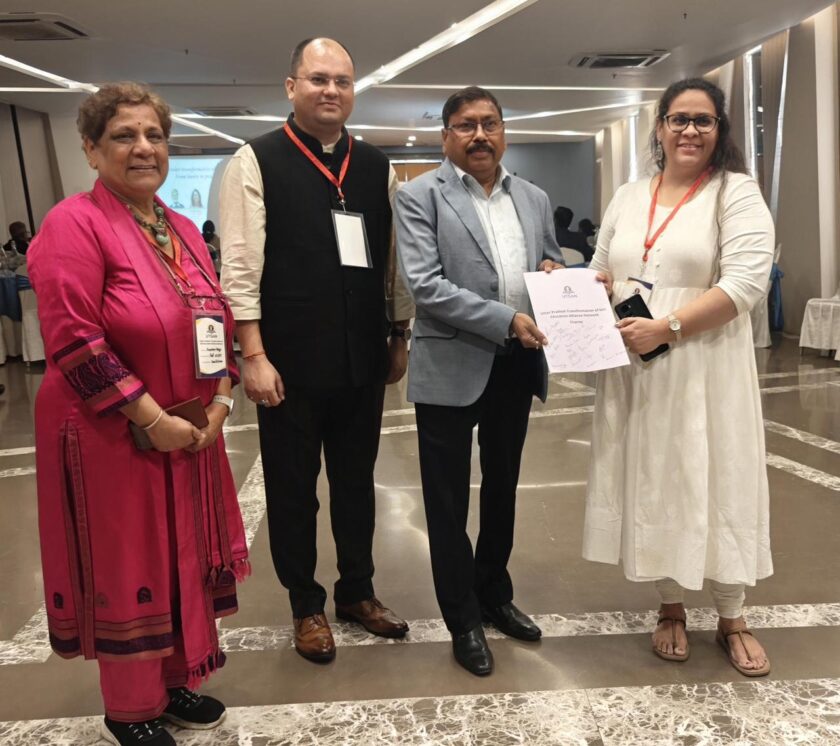Lucknow: In Lucknow, schools such as City Montessori School (CMS), La Martiniere College, and Seth M.R. Jaipuria School are cultivating entrepreneurial mindsets among students, creating a foundation for them to become future startup founders through innovative curricula, extracurricular activities, and exposure to the city’s thriving startup ecosystem. CMS, with 60,000 students across 21 campuses, is a global leader in education, recognized by the Guinness World Records as the world’s largest school.
Founded in 1959 by Dr. Jagdish Gandhi, it emphasizes nurturing “thoughtful and proactive world citizens” through a curriculum blending ICSE and ISC boards with peace education and human values. “Education is about preparing students to innovate and solve real-world problems,” Gandhi has stated, reflecting CMS’s focus on fostering creativity. The school’s robotics labs, like the one at Gomti Nagar II campus, and events like the International Youth Festival encourage students to develop problem-solving skills, essential for entrepreneurship. CMS’s alumni, including IPS officer Gyaneshwar Singh and BJP MP Sudhanshu Trivedi, showcase its impact, though direct student startups are not explicitly documented. Its scale and prestige make it a hub for inspiring ambitious thinking, aligning with Lucknow’s startup culture.
La Martiniere College, established in 1845 by Major General Claude Martin, is an elite ICSE-affiliated institution with separate boys’ and girls’ campuses, known for its rich academic heritage and sprawling 200-acre campus. “Labore et Constantia” (Work and Constancy), the school’s motto, underscores perseverance, a key entrepreneurial trait. With a 25:1 student-teacher ratio, it offers personalized attention, fostering leadership through activities like Model United Nations, debates, and sports such as cricket and horse riding. “The school creates a warm and joyful learning environment that inspires students to develop a love for learning,” says Aashrita Dass, head of La Martiniere Girls’ College. The school’s strong alumni network, including figures like actor Ali Fazal and Miss India Priyanka Chopra, provides role models for students, though no specific entrepreneurship programs are noted in recent data. Its emphasis on holistic development and co-curricular activities like drama and music nurtures creative thinking, vital for startup ideation.
Seth M.R. Jaipuria School, founded in 1992, is an ICSE-affiliated institution on a 10-acre campus, known for its student-centered approach and collaboration with “Teachers without Borders” for innovative teaching. “We aim to nurture innovators who shape the future,” says principal Promini Chopra. The school integrates design thinking and business ideation workshops, encouraging students to pitch ideas in competitions, simulating startup environments. It was ranked second in Lucknow by digital LEARNING in 2017, reflecting its academic and innovative excellence. Students like Ansh, who scored 98% in ISC exams in 2013, highlight its academic rigor, while testimonials from parents like Kavita Tandon praise its nurturing environment: “The school’s focus on holistic development has significantly contributed to my daughter’s growth.” Jaipuria’s emphasis on extracurriculars like sports and cultural events fosters leadership and teamwork, key for entrepreneurial ventures.
Beyond school-specific efforts, Lucknow’s broader ecosystem supports this entrepreneurial push. The Uttar Pradesh Startup Policy, fostering 3,406 startups by 2022, including 515 in Lucknow, integrates entrepreneurship into school curricula. “The policy creates an ecosystem where young minds can innovate,” a state official noted. Schools leverage this by inviting local entrepreneurs like Dharmil Sheth of PharmEasy, who said, “I started PharmEasy to make medicines accessible,” to inspire students. External programs like Google’s Startup School India, as Varun Alagh of Mamaearth noted, “bridge need gaps for young entrepreneurs,” offering virtual training in prototyping and strategy. IIM Lucknow’s incubation center, led by Prof. Krishna Chandra Balodi, promotes a culture of responsible business: “Sustainability-oriented startups create a cascading effect.”
Programs like EduAce’s School Quiz League, engaging over 2,500 schools, foster critical thinking, with a spokesperson stating, “Quizzing ignites curiosity and problem-solving.”
While these schools excel in building entrepreneurial skills, direct evidence of students founding startups during school is scarce. The focus is on long-term preparation through skills like coding, financial literacy, and leadership. CMS’s robotics labs, Jaipuria’s business workshops, and La Martiniere’s leadership activities create an environment where students can envision entrepreneurial futures. Local startups like HealthTokri and Keeros serve as case studies, inspiring students to think locally.
However, challenges remain, as some parents, like Anas Elahi, note CMS’s academic pressure can overshadow creative pursuits: “Studying is important, but not to this extreme.” Despite this, the combination of innovative education, government support, and exposure to role models positions Lucknow’s schools as key players in nurturing future startup founders. For deeper insights, tracking alumni entrepreneurial ventures or specific school-led startup incubators would be necessary.

---------------------------------------------------------------------------------------------------














